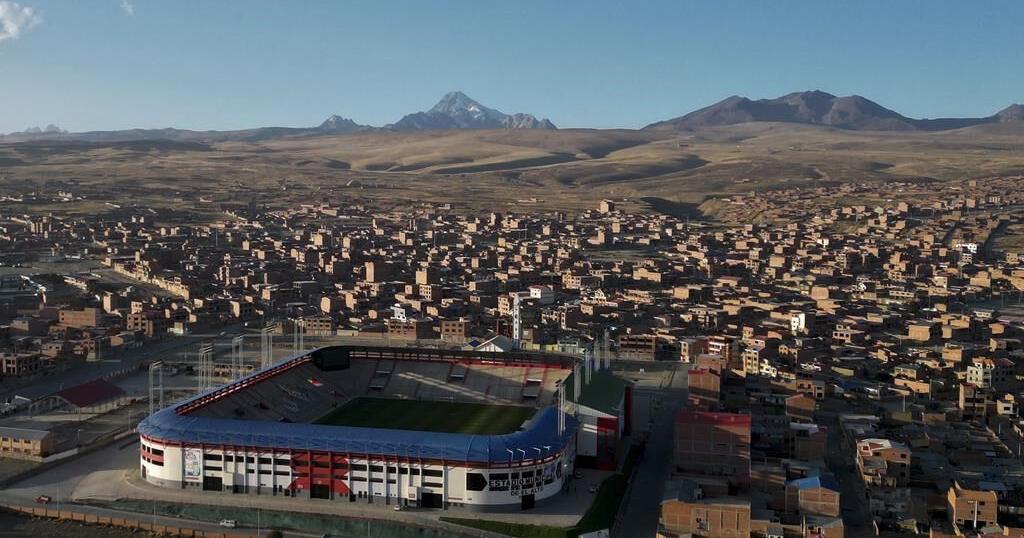EL ALTO, Bolivia (AP) — Bolivia has always been a difficult place to play.
Now the challenge is even higher. Literally.
The men’s national soccer team is hoping that hosting World Cup qualifiers at an altitude higher than ever will help it improve in the South American standings.
The Bolivians usually play in the capital La Paz at 3,640 meters (11,940 feet) above sea level, but the South American soccer body CONMEBOL has allowed them to move their games to El Alto, the second largest city in the country at an altitude of 4,150 meters (13,615 feet). That’s as high as nine Empire State Buildings on top of each other.
With one win and five losses, Bolivia is second to last in the standings, and needs a win on Thursday against visiting Venezuela, which is fifth and coming off a quarterfinal run at the Copa America.
New Bolivia coach Oscar Villegas will make his debut after replacing Antonio Carlos Zago, who was fired in July after a winless Copa. Villegas hopes to exploit the higher altitude by picking a squad in which 80% of the players are used to the thinner air, including six from Always Ready club in El Alto, and six more from Bolívar in La Paz.
“Soccer is made of details. It does not mean that with this (changing stadiums) we are going to win,” says Villegas, a former La Paz striker. “We are trying to take care of details that can allow us to be more effective.
“In El Alto, we are going to try to be as intense as possible and to let them know that they are on a new pitch where we have been unbeatable,” Villegas said, referring to local teams playing there in club competitions such as Copa Libertadores and Sudamericana. “The psychological and emotional aspect also plays a role, it is something that is going to help us a lot.”
El Alto Municipal Stadium opened only in 2017 and is considered a jewel in the Bolivian highlands. On its green grass, marked in white, is the phrase, “You play where you live.”
Oval-shaped with seating for 24,000 spectators, the El Alto stadium is smaller than the 40,000-seat Hernando Siles Stadium in La Paz. But El Alto’s elevation is 560 meters (1,840 feet) higher.
The president of the Bolivian Football Federation, Fernando Costa, says the stadium is being trialed to see how the players respond, to determine if El Alto can become a permanent venue for home games.
Venezuela’s home matches are at sea level, and it has not complained about the change of venue, but it is taking measures.
In a preliminary squad of 47 players, Venezuela coach Fernando Batista included some who are active in cities where the game is played at altitude, among them goalkeeper Alain Baroja from Bolivian club Always Ready. The Venezuelans are preparing by undergoing oxygen breathing exercises and acclimatization in hyperbaric chambers.
Not everyone agrees that first-class soccer should be played at high altitudes.
Tite, the coach of Brazilian club Flamengo, says it is “difficult” to play at altitude after they lost to Bolívar 1-0 in La Paz two weeks ago in the Copa Libertadores last 16.
In 2007, FIFA criticized matches at the height of La Paz and ruled that international games could not be played above 2,750 meters. However, the next year FIFA backtracked after objections from Bolivia, where most stadiums are above that altitude.
“The field has been approved by CONMEBOL because it meets all the requirements they have requested,” Edmundo Vargas, municipal sports director of El Alto, told The Associated Press.
But there is little research on playing soccer at more than 4,000 meters above sea level, as will occur on Thursday.
“We always recommend that any athlete have a prior evaluation before coming to altitude and an adaptation period,” said Jesús Jiménez, a researcher at the Bolivian Institute of High-Altitude Biology.
He was skeptical about claims that the high-altitude gives Bolivia an advantage over other teams, noting that “Bolivia has lost before on its home ground.”
Bolivia hasn’t qualified for the World Cup since 1994.
___
